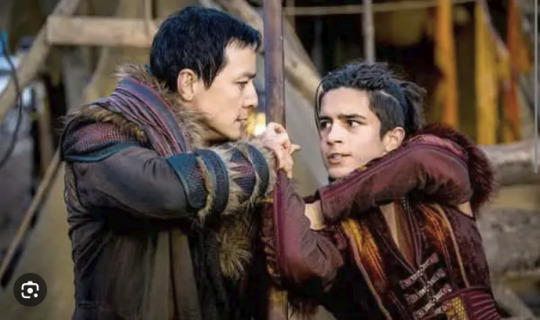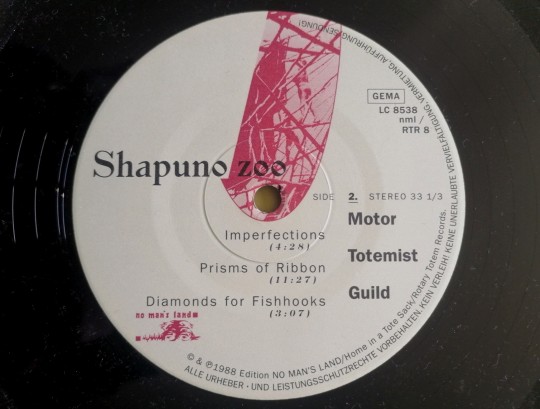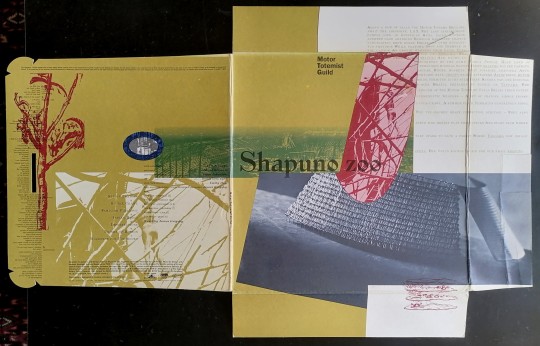#totemists
Explore tagged Tumblr posts
Text
youtube
Motor Totemist Guild, Set of crayons I Shapuno zoo, 1988
2 notes
·
View notes
Text




The MOTOR TOTEMIST GUILD
"Omaggio a Futi"
(LP. Auf Dem Nihil / Recommended rcds / Rotary Totem rcds. 1989 / rec. 1982-88) [US]
youtube
6 notes
·
View notes
Text


Various Artists - Bad Alchemy Nr 5 (1986)
#bad alchemy#rick potts#joseph hammer#the motor totemist guild#s.b.o.t.h.i.#p16.d4#biota#proof of utah#the deep freeze mice#günter müller#marina la palma#rimarimba#lars rudolph#guy de bièvre#mixed band philanthropist#semantics#loading
0 notes
Text
"The brute fact is that many modern people in our culture believe that Christianity is profoundly antiquated insofar as they see it as a set of answers to questions that nobody is even asking anymore. Questions like “How can I be saved from my sins?” seem like totemistic holdovers from ancient fears of angry gods that require us to kill a few goats as appeasement. It smacks of a God, or gods, obsessed with moral purity, especially in the sexual sphere, and who demand some blood sacrifice, some pound of innocent flesh, to “set things right.” For many of our contemporaries, therefore, the story of the butchered, murdered Christ, whose death is “needed” by God before He will show us mercy, and which if we do not accept as true will send us into eternal conscious torment, seems like a Judaic iteration of vengeful pagan deities. These are realities therefore, however distorted and caricatured, that are driving the flight from faith.
And the Church herself is viewed within this essentially bestial schema as well. Unfortunately, an overly narrow reading of extra ecclesiam nulla salus (“outside of the Church there is no salvation”) turned the Church into a kind of sacramental protection racket where attendance and participation is demanded of you “for your salvation/protection” or else the God of love will send his capo regime thugs to break your legs and send you to hell because you got the “religion test” wrong [...] And given that this is their view of what it is we believe, then even if there really is a hell, they would prefer it to the Godfather’s heaven. They are all latter-day Huck Finns who, thinking helping his friend, the slave Jim, was a damnable offense, exclaimed, “Alright then, I will go to Hell.”
Obviously, I do not agree with such caricatures of the Christian worldview. However, this is precisely how many moderns view us. And more importantly, it is how they view the God we are proposing to them as their putative “savior.” Furthermore, the depth of their rejection can be gauged by their knowledge that in rejecting this imagined God of Christianity, they have left themselves adrift and with very few viable spiritual alternatives. And even as they feel deeply the clawing, grasping, and almost living rapaciousness of the nihilistic abyss below, and even as they stare, steely-eyed, at death, with the deep suspicion that what awaits us is precisely nothing but annihilation and un-existence, they still cannot accept this God of the Christians [...]"
— Larry Chapp: "True Pastoral Accompaniment Requires an Accurate Reading of the Signs of the Times"
7 notes
·
View notes
Text





For This Land: Writings on Religion in America, Vine Deloria Jr
The essence of the Indian attitude toward peoples, lands, and other life forms is one of kinship relations in which no element of life can go unattached from human society. Thus lands are given special status because they form a motherhood relationship with the peoples who live. on them. Too often this dimension is twisted when non-Indians make it a sentimental truism and the Indian philosophy appears shallow and without insight. But the true meaning of the motherhood of the land is that, like a mother, it shapes and teaches our species and, according to the peculiarity of the area, produces certain basic forms of personality and social identity which could not be produced in any other way. White Americans see the basic differences in peoples which are expressed regionally but they too often mistake historical experiences for the influence of lands on people. To find a "southern" identity without understanding the unique characteristics of the southeastern lands is to vest in the memories of our species a shaping ability which does not exist. According to geographical area radical differences occur which are more than historical accidents and which require reflective consideration to understand fully.
With respect to other life forms, this attitude manifests itself in what one could call "kinship" cycles of responsibility that exist between our species and the other species. Hyemeyosts Storm attempts to bring this unique web of responsibilities into play with modern terminology in his book Seven Arrows, when he allows non-human characters to participate in the unfolding of the story. This transformation brings out a dimension of life common to Indians but unique and unsuspected by non-Indians. For the responsibility of our species is to perform responsible tasks with respect to each form of life that we encounter, learning from them the basic structure of the universe, and ensuring that they receive in return the respect and dignity accorded them. And this acknowledgement of the dignity of other life forms, which is a simple but profound recogni tion, underlies all Indian attitudes toward the organic world. Our species is allowed to use them for food but in return we must ensure that their sacrifice becomes a means of fulfillment. Social scientists, observing Indian behavior toward animals and plants, usually describe this activity as "totemistic" or "animistic" implying that Indians intellectually believed the universe to contain uncontrolled and arbitrary powers. But the essence of this behavior is the maintenance of dignity throughOut the organic world. The struggle for dignity thus dominates Indian spirituality but the struggle is one of conferring dignity, not seizing or manufacturing it.
Many non-Indians come to understand the bestowing of dignity on others, even on other life forms, but they still fail to see the fundamental distinctions which flow from the Indian attitude of reflection. Perhaps the most basic of these distinctions is the recognition of sexual and age differences. The traditional ethical norm for non-Indians is the admission of the brotherhood of our species and the concomitant responsibility to treat others like we would like to be treated. Equality and unity easily become a homogeneity in this ethic. American Indians view ethical relationships with much more sophistication, allocating duties, privileges and respect according to a unique system of family relationships, older people becoming grandfathers and grandmothers, men and women becoming brothers and sisters, wives and husbands, and even strangers occupying the place of cousins within the network of specific relatives who must show concern for one another. Apart from participation in this network, Indians believe, a person simply does not exist. But within the network attitudes and behaviors must be expressed in particular terms, not in general and often unfulfilled rules of conduct.
Following directly from this ethic is the American Indian understanding of human personality and the meaning of life. If we are required to show respect and create dignity for others around us, then this respect and dignity cannot be simply a surface admission of social status. Dignity can be given even to the unworthy with devastating irony and people within the community can see in the most precise fashion whether or not the individual who is honored in fact deserves such praise. Such lavish but undeserved praise can be more damning than an insult.
Individuals strive as best they can to deserve the dignity which the community gives them and it is extremely embarrassing to be praised and honored by one's better while failing to perform according to expecta; tions. Giving dignity therefore encourages individuals to deserve the accolades they receive and the unified attitude of social groups towards the world and towards others is the cultivation of virtues. A person hailed as wise, strives to be wiser, a person acclaimed as brave, seeks to be braver, and a person honored as a parent seeks to become better in that endeavor.
The intense individual concern to deserve the respect and dignity which one's family and society accords one produces a mature attitude of reflection which grows with the passage of years and the accumulation of experiences. Experiences are hardly an individual affair, however, for within each community is the collective memory of past events and the behavior of people within that immediate history is common know-edge. Over decades of community life the leadership emerges as the community recognizes in the continual activities of individuals a sense of consistency, of commitment to the community, and of the course of wise decisions. As people come to deserve the respect and dignity with which they are presented, the community forms around the time-tested people of substance. In most Indian communities in the old days the most respected person was the one who gave freely of physical wealth, who showed a concern for the unfortunate, and who allowed weaker members of the community to rely on him/her. Reflection, then, is a way of life, the consistent direction and substance of individual existence, and not a unique intellectual ability. It is a matter of extended consis-fency in behavior, not a matter of correct or numerous beliefs.
The circle of these concepts can be seen to be integrated into a basic attitude toward life and its experiences. Rather than leading to a logical conclusion we see a network of attitudes and behaviors which characterize both individuals and societies. Nothing derives from a cause-and-effect chain of circumstances. Everything becomes an aspect of everything else, distinguishable only by the unique situation in which individuals are called upon to respond to new conditions. Without the
13 notes
·
View notes
Text
will someone think of the totemistic nature of the penis or is it just me and camille paglia
7 notes
·
View notes
Text
[...]
A long time ago, while conducting research for my master’s thesis on how the economic reforms of [French President] Emmanuel Macron had closed the circle started by [François] Mitterrand, I came to realize that the old Thatcherite idea, “There is no society, only individuals with the freedom of choice,” had become so commonly accepted in contemporary society that both right– and left-wing neoliberals today feel no need to emphasize it.
Social surveys have also found a shocking lack of empathy and solidarity among communities in the U.S. and Western Europe, exactly at the time the dominant political narratives have begun to insist on inclusiveness and tolerance toward others. Subtle distinctions in definitions can often reveal commonly understood and yet unspoken differences between terms that we prefer to use: Inclusiveness does not necessary oblige solidarity or empathy, just as tolerance in the absolute sense means merely withholding action based on existing animosities, which are acknowledged by the very need for the usage of the term in question. Tolerance, indeed, does not have to mean understanding and accepting increasingly distant “others.”
A question must be asked: Are we now, through ideological terminology, searching for exactly those things that we are in fact missing in our social reality? The need to define ideological terms prompts this question in that it arises only when certain notions have left the sphere of unspoken social consensus—the very frame of political and social thought.
In his latest book, The exiled terms, Todor Kuljić, who is among the most internationally recognized Serbian sociologists of the previous and current century, explains how four decades of neoliberal reforms have influenced significant changes in the language we use to discuss ideology and politics, noting that all the terms previously connected to class inequalities, Marxist ideologies, and collective struggles of the working class have been systematically replaced with less critical, less “communist sounding” terms.
In sociology curricula, the terms “exploitation,” “revolution,” and even “humanism” have been almost completely forsaken, while we can see increased usage of words such as “transition,” “transformation,” and “social exclusion.” The term “transition,” a case in point, normalises poverty and corruption in countries that need to be convinced that they will be much better off when they adopt neoliberal economic models.
The famous comedian George Carlin put forward a notion that there is a cultural tradition in the United States of constantly inventing new terms, and “exiling” the old-fashioned terms, which derives from the constant need to make the brutalities of everyday life more easily accommodated. “Americans have trouble facing the truth,” Carlin once said, “so they invent a kind of soft language to protect themselves from it.” If poor people used to live in slums, to cite one of Carlin’s standup routines, “now ‘the economically disadvantaged’ occupy ‘substandard housing’ in ‘inner cities.’”
Anthropological studies have shown that this tendency has certain connections with the totemistic belief of the earliest human societies that, by changing the way we verbally identify a certain aspect of reality we can change the reality itself. It appears that this has never been more relevant than in the case of the modern culture of political correctness, which proposes that we accept social problems as consequences of our subconscious thoughts and/or individual actions, and try to solve them by changing the language we use to define them—while never searching for their material causes.
Professor Jordan Peterson has claimed that modern-day political culture developed in a manner in which the previously presumed need for objectivity was replaced with subjective feelings and perceptions, while the very understanding of material reality has been, through relativization, reduced to little more than an inconvenience that can be regulated by state legislation and group stigmatization. On the other hand, Slavoj Žižek holds that it is precisely the abandonment of the collective (ideas) for the individual (interests) that has led our increasingly globalized political culture down this path. The neoliberal, postmodern left has merely followed the neoliberal right of the eighties in the project of eliminating undesirable terminology related to physical, class, and social reality—depending on the preference of each—from the common frames of political debate, since a consensus on understanding material reality is the first and necessary condition of the collective political struggle.
Žižek also claims that the phenomenon of New Age leftists striving toward zealous political correctness merely contributes to depriving formal and informal human relationships of what is the very essence of humanity. This is because following the increasingly strict standards of Newspeak, as Orwell would put it, necessarily increases the distance between people by making them focus on their differences, thus continuously reinforcing the same barriers neoliberal leftists wish to break free of, while, at the same time, leaving them unable to overcome the tensions of every-day interactions through humor and other forms of releasing the burdening contents of the individual and collective subconscious.
Further, if we take into account the previously mentioned thesis of Professor Kuljić, we can also propose the question: To what extent is the modern neoliberal leftist obsession with political correctness a consequence of the absence of a language and terminology by which young people could articulate the actual causes of their fear and anger and the need to express political radicalism? Of course, leftists of this persuasion remain thoroughly within the existing frame of the globally dominant ideology and never challenge the economic and political system.
At the same time, neoliberal right-wing policies continue to insist on the previously discussed narrative of personal responsibility—or, rather, personal “guilt”—not for the problems of cultural inequalities, which their leftist counterparts remain unable to relate to their actual causes in material reality, but rather for the position of the individual in the new economic order. Now in social media we witness the rise of an entire generation of young conservatives who present success and failure in life—mostly defined by the acquisition of wealth rather than personal happiness—as a consequence of individual decisions and actions, entirely decontextualized and removed from one’s personal circumstances, class background, and social context.
Unlike the previous authors of the self-help books from the early eighties, these new “life coaches” of the internet are heavily engaged in the relativization of ethics, with some going as far as to conclude that those who stay employed in times of low wages and worsening labor conditions, instead of risking their financial existence with private business gambles, have no one but themselves to blame for being exploited. Thus, in a perverted sense of logical framing, they arrive very close to an argument used by ancient Greek philosophers to justify slavery: “An Athenian would rather kill himself than become a slave.”
Neoliberal leftists legitimize the unfair treatment of others for personal gain with the condition that you address respectfully the same people whom you are exploiting—and, as well, disregard solidarity as the core value of the left. Contrarily, the neoliberal right wing insists that participation in the hierarchy of social and economic power is a goal necessary to achieve and a matter of personal choice, and not at all of social reality. It is as though they, the neoliberal right wing, have forgotten with how much effort traditional conservatives tried to uphold the principles of ethics—even if many of those principles were not part of the initial humanist–Enlightenment agenda, or universal values as Immanuel Kant would define them, but served only to preserve position and ensure reproduction of the upper classes—as though there truly was no society anymore.
Not even the Prussian militarists of the old German Empire ever went so far as to assert openly that there is no common good, not even a universal moral code, and that, rather, you should seek to enrich yourself at the expense of others just to prove your own capabilities to a society you don’t even believe in anymore. But modern-day conservatives have crossed this line by seducing today’s ever more fearful youth with the promises that, if they prove capable enough, they can assume the role of the oppressor themselves and exploit the weak, who deserve their fate for failing to seize the “boundless opportunities” of some neoliberal economic paradise.
Thus, prevalent neoliberal left– and right-wing ideologies have not just disregarded, fragmented, or redefined traditionally universalist principles of ethics; they have also forsaken many “core values”—an emphasis on collective solidarity or personal liberty, common wellbeing, or individual morality—which defined the differences between the significant left– and right-wing ideologies of the previous two centuries. Even more important, humanity has been almost completely exiled from the sphere of ideological priorities—in favor of politically correct formality in the case of the New Age left, or, in the case of the New Age right, in favor of a convenient indifference to social problems. The value of humanity, in the sense in which it was understood during the course of the 20th century, will therefore have a hard time finding its way back into the ideological frames of the new world order.
Luka Filipović, among the youngest Serbians ever to earn his doctorate, holds a Ph.D. awarded by the Faculty of Philosophy at the University of Belgrade. He has published numerous articles regarding the history of labor movements, communist parties, neoliberal economic reforms, and political turmoil of the late 20th century in Europe and Serbia. His book, Eurokomunizam i Jugoslavija 1968-1980,(Eurocommunism and Yugoslavia 1968–1980), is published this month by the Institute for Contemporary History in Belgrade, where Filipović currently conducts his research.
19 notes
·
View notes
Text
Since I was just reminded of TH White’s notes on lancelot I want to put them here in full to see if anyone else sees what I see (Ethan hunt!!!!!!!!! Ethan hunt!!!!!!!!!!!!)
Malory's Lancelot is:
1. Intensely sensitive to moral issues.
2. Ambitious of true--not current--distinction
3. Probably sadistic or he would not have taken such frightful care to be gentle.
4. Superstitious or totemistic or whatever the word is. He connects his martial luck with virginity, like the schoolboy who thinks he will only bowl well in the match tomorrow if he does not abuse himself today.
5. Fastidious, monogamous, serious.
6. Ferociously punitive to his own body. He denies it and slave-drives it.
7. Devoted to "honour," which he regards as keeping promises and "having a word." He tries to be consistent.
8. Curiously tolerant of other people who do not follow his own standards. He was not shocked by the lady who as naked as a needle.
9. Not without a sense of humour. It was a good joke dressing up as Kay. And he often says amusing things.
10. Fond of being alone.
11. Humble about his athleticism: not false modesty.
12. Self-critical. Aware of some big lack in himself. What was it?
13. Subject to pity, cf. no. 3.
14. Emotional. He is the only person Malory mentions as crying from relief.
15. Highly strung: subject to nervous breakdowns.
16. Yet practical. He ends by dealing with the Guenever situation pretty well. He is a good man to have with you in a tight corner.
17. Homosexual? Can a person be ambi-sexual--bisexual or whatever? His treatment of young boys like Gareth and Cote Male Tale is very tender and his feeling for Arthur profound. Yet I do so want not to have to write a "modern" novel about him. I could only bring myself to mention this trait, if it is a trait, in the most oblique way.
18. Human. He firmly believes that for him it is a choice between God and Guenever, and he takes Guenever. He says: This is wrong and against my will, but I can't help it.
#DO YOU SEE DO YOU SEE DO YOU GET IT#incidentally it’s just worth having these notes on my blog and saving them cause they crop up in my mind so often#mission impossible#ethan hunt#cecil meta#kinda
11 notes
·
View notes
Text
Into the Badlands (2015) 荒原



Director: David Dawkin Screenwriter: Alfred Goff / Miles Millar / Michael Jones-Morales Starring: Daniel Wu / Emily Beacham / Sarah Burger / Ola Brady / Marton Cocks / Aramis Knight / Madeline Mantock / Alan Holman / Stephen Lang / Morgan Benoit / Eddie Gaethje / Sam Medina / Shane Graham / Lance E. Nichols / Owen Hahn / Starlett· Miaglioni / Johns Myers Genre: Action / Adventure Official website: www.amctv.com/shows/into-the-badlands Country/Region of Production: United States Language: English Date: 2015-11-15 (USA) Number of seasons: 3 Number of episodes: 32 Single episode length: 60 minutes Also known as: Deep into the Badlands / 深入恶土 / Deserted Land / 荒芜之地 / Into the Dangerous Lands / 深入险地 / In Bad Lands / 穷山恶水 / American Version of Journey to the West / 美版西游记 / Badlands IMDb: tt3865236 Type: Reimanging
Summary:
Daniel Wu plays the motorcycle-riding Sun Wukong, a brave warrior named Sunny who escorts a young teen called M.K. with a heavy responsibility (Tang Monk) in search of the legendary Paradise. In a postapocalyptic world approximately 500 years in the future, war has left civilization in ruins. Some elements of technology, such as electricity and ground vehicles, have survived the apocalypse, but society now shuns firearms, leading to a reliance on melee weaponry and crossbows.
In a territory known as the Badlands, encompassing several states located between the Rocky Mountains and Mississippi River, a feudal society has developed to fill the power vacuum left by the war. Barons control land and monopolies over commodities like opium and fuel, trading amongst themselves to maintain the peace. Each baron is served by a massive workforce of slaves called cogs, as well as a prostitute class called dolls. A baron maintains power through an army of young men and women called clippers: highly trained and loyal warriors, clippers are forbidden from marrying and having children lest their loyalties be divided. Each clipper force is captained by a regent.
Several groups exist outside the strict hierarchy of the barons. Nomads are the most common, mostly lawless homicidal bandits who subsist on stealing from trade convoys between the baronies but some live in organized clans. The River King and his men control water trade in the Badlands and beyond, and is considered a neutral party in the barons' power struggles. An ascetic religious movement called the Totemists is also shown to exist on the fringes of society, living in isolated communities and practicing a form of idol worship. The Widow leads a revolutionary group of anti-feudal fighters from her late husband's barony; although nominally recognized as a baron by her peers, they do not respect her, and the contempt is mutual.
Little is known of the world beyond the Badlands, but it is implied that it is far less politically stable yet environmentally sound like the Badlands. The mythical utopian city of Azra is believed to exist outside the Badlands, but most dismiss it as a legend.
Source: https://en.wikipedia.org/wiki/Into_the_Badlands_(TV_series)
Link: N/A
#Into the Badlands#荒原#Deep into the Badlands#Deserted Land#Into the Dangerous Lands#In Bad Lands#American Version of Journey to the West#Badlands#jttw media#jttw television#television#lost media#live action#reimagining#alternative universe#sun wukong cameo#tang sanzang#zhu bajie
8 notes
·
View notes
Text
I should make icons for this gal and name her cause I just really wanna play a Totemist gal-
2 notes
·
View notes
Text

Also funny note, last night my DM was pointing out I'm the only member of the party without either Low Light Vision or Dark Vision. I promptly pointed out I can access it as a class feature starting at level 2~
Gotta love running a Totemist~
3 notes
·
View notes
Text






The MOTOR TOTEMIST GUILD
"Shapuno Zoo"
(LP. No Man's Land / Rotary Totem rcds. 1988 / rec. 1987) [US]
2 notes
·
View notes
Text
I've said it before and I'll say it again - this totemistic hatred for Columbus as if he's the guy solely responsible for what happened to the native peoples of the Americas is baffling, insane and stupid.
Very human, since building totems of someone and blaming everything on them is kind of our schtick, but let's maybe stop?
0 notes